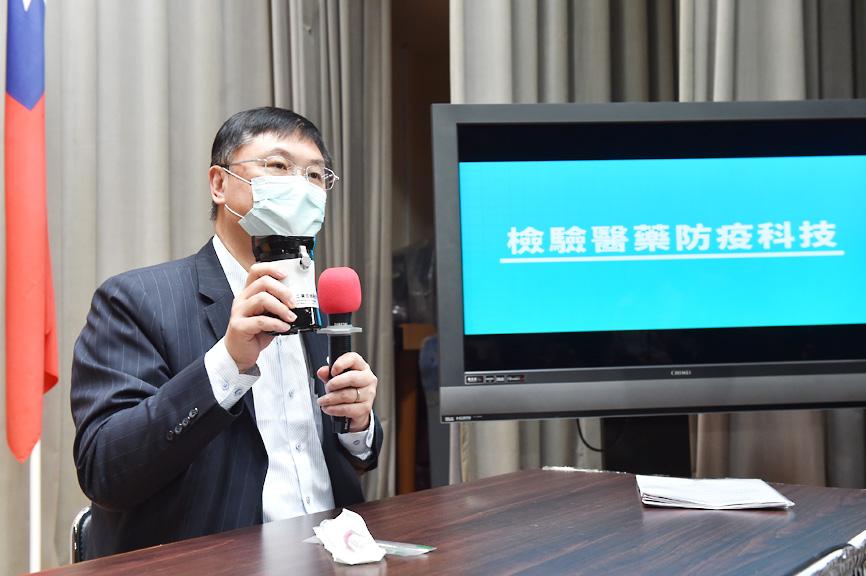A COVID-19 rapid testing kit developed by the Industrial Technology Research Institute (ITRI) should be ready for mass production as soon as July, officials announced yesterday.
The kit, which works by testing nucleic acids, can produce results within one hour, Deputy Minister of Economic Affairs Lin Chuan-neng (林全能) told a news conference at the Executive Yuan in Taipei, adding that this brings researchers one step closer to developing a vaccine.
The government has invested NT$2.16 billion (US$71.7 million) in the testing, treatment, prevention and research of the disease, National Health Research Institute (NHRI) president Liang Kung-yee (梁賡義) said.

Photo: Chen Yu-fu, Taipei Times
The nation is developing three testing methods, he said.
The first involves testing nucleic acids, which was the focus of the research at the ITRI, he said.
Another method involves testing nucleocapsid and spike proteins, which is being developed by researchers from Academia Sinica and the NHRI, he said.
That test could produce results in 15 to 20 minutes, and might also be ready for mass production by July, he said.
Nearly 20 companies attended an information session held by Academia Sinica and the NHRI to present their research, five of which expressed an interest in producing the test, he said.
The third type involves testing antibodies produced by the human body, and could be used on patients in recovery, he said.
Research on this method, which can produce results in 15 to 20 minutes, is being done at Chang Gung University in Taoyuan, he said, adding that mass production could commence in October.
“It is possible that COVID-19 will mutate into a form of influenza,” Liang said, adding that a vaccine and effective medication for treatment would be crucial if that happens.
The NHRI and Academia Sinica had already produced a 10g sample of their testing compound and could go into production now, he said.
Researchers are also experimenting with a combination of the Japanese antiviral drug favipiravir and other drugs for the treatment of patients with mild to moderate symptoms, he said.
The drug’s effectiveness against COVID-19 is being compared with that of another antiviral medication, remdesivir, and a synthesized drug has shown promise, he said, adding that companies have shown an interest in producing it.
A third drug, quinine — which is commonly used to treat malaria and babesiosis — has also shown promise in the treatment of COVID-19 patients with mild symptoms, he said.
Moreover, researchers have been separately developing six possible vaccines since late January and hope to arrive at a solution by the end of next month.
“If everything goes smoothly, we could see clinical trials by the end of the year,” he said.
“Several countries have expressed hope to work with Taiwan to produce a vaccine and rapid test,” he said.

Right-wing political scientist Laura Fernandez on Sunday won Costa Rica’s presidential election by a landslide, after promising to crack down on rising violence linked to the cocaine trade. Fernandez’s nearest rival, economist Alvaro Ramos, conceded defeat as results showed the ruling party far exceeding the threshold of 40 percent needed to avoid a runoff. With 94 percent of polling stations counted, the political heir of outgoing Costa Rican President Rodrigo Chaves had captured 48.3 percent of the vote compared with Ramos’ 33.4 percent, the Supreme Electoral Tribunal said. As soon as the first results were announced, members of Fernandez’s Sovereign People’s Party

MORE RESPONSIBILITY: Draftees would be expected to fight alongside professional soldiers, likely requiring the transformation of some training brigades into combat units The armed forces are to start incorporating new conscripts into combined arms brigades this year to enhance combat readiness, the Executive Yuan’s latest policy report said. The new policy would affect Taiwanese men entering the military for their compulsory service, which was extended to one year under reforms by then-president Tsai Ing-wen (蔡英文) in 2022. The conscripts would be trained to operate machine guns, uncrewed aerial vehicles, anti-tank guided missile launchers and Stinger air defense systems, the report said, adding that the basic training would be lengthened to eight weeks. After basic training, conscripts would be sorted into infantry battalions that would take

GROWING AMBITIONS: The scale and tempo of the operations show that the Strait has become the core theater for China to expand its security interests, the report said Chinese military aircraft incursions around Taiwan have surged nearly 15-fold over the past five years, according to a report released yesterday by the Democratic Progressive Party’s (DPP) Department of China Affairs. Sorties in the Taiwan Strait were previously irregular, totaling 380 in 2020, but have since evolved into routine operations, the report showed. “This demonstrates that the Taiwan Strait has become both the starting point and testing ground for Beijing’s expansionist ambitions,” it said. Driven by military expansionism, China is systematically pursuing actions aimed at altering the regional “status quo,” the department said, adding that Taiwan represents the most critical link in China’s

‘REALLY PROUD’: Nvidia would not be possible without Taiwan, Huang said, adding that TSMC would be increasing its capacity by 100 percent Nvidia Corp CEO Jensen Huang (黃仁勳) on Saturday praised and lightly cajoled his major Taiwanese suppliers to produce more to help power strong demand for artificial intelligence (AI), capping a visit to the country of his birth, where he has been mobbed by adoring fans at every step. Speaking at an impromptu press conference in the rain outside a Taipei restaurant, where he had hosted suppliers for a “trillion-dollar dinner,” named after the market capitalization of those firms attending, Huang said this would be another good year for business. “TSMC needs to work very hard this year because I need a lot